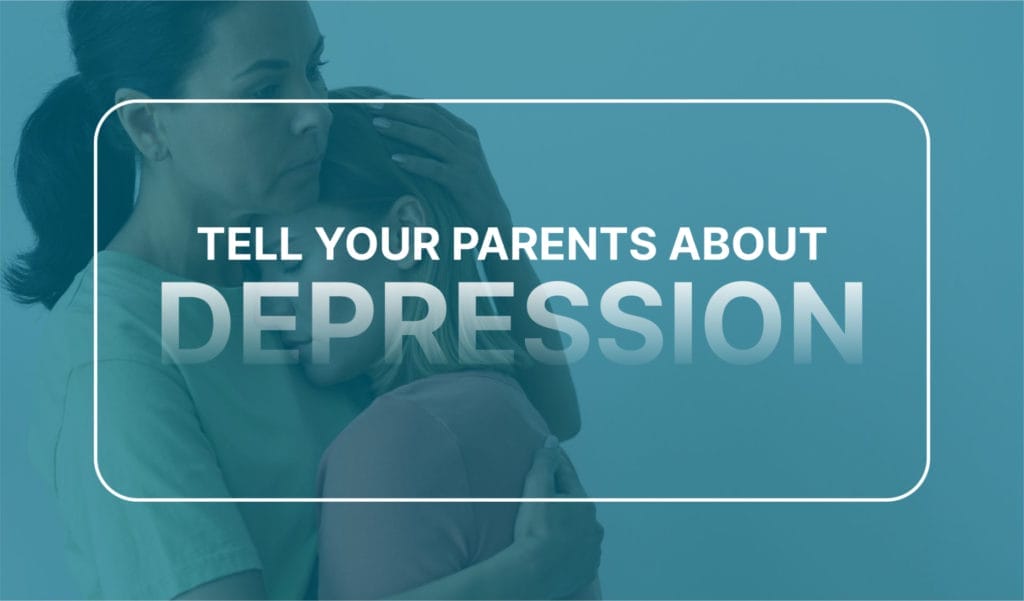Talking to your parents about depression can feel like an overwhelming, frightening, and maybe even impossible task. It’s natural to hesitate, worry about their reaction, or wonder if they’ll even understand how you feel. But talking about your mental health is a brave and important first step toward feeling better.
The following guide demystifies the topic, offering insight into what depression looks like and strategies on how to open up to your parents about depression to make the conversation a little bit easier.
Why It’s Important to Tell Your Parents If You’re Depressed
Regardless of gender, depression thrives in silence and isolation. Talking to your parents can be the first step towards getting the help and support you need. Parents can offer a listening ear, provide emotional support, and help you find professional help.
Although telling your parents about your struggles can be scary, it’s important to remember that seeking help is not a sign of weakness but a sign of strength. Your parents love you and want to see you happy. Having their support during this difficult time can help you feel better.
However, before you can have an open and honest conversation about depression, it is important to understand what it is and its symptoms so that you can best determine how to express yourself.

Understanding Depression
According to the American Psychiatric Association, depression is a common and serious mental health condition that negatively affects how you feel, the way you think, and how you act.
The World Health Organization estimates that depression affects 280 million people worldwide, including teenagers. In fact, a ten-year data summary and trends report released by the US Centers for Disease Control and Prevention (CDC) found that more than 1 in 3 high school students had experienced persistent sadness or hopelessness.
There are many forms of depression, which can cause a range of symptoms, including:
- Low mood and sadness
- Loss of interest in activities you used to enjoy
- Changes in sleep or appetite
- Feelings of worthlessness or guilt
- Difficulty concentrating or making decisions
- Thoughts of death or suicide

How To Open Up to Your Parents About Depression
Now that you have a clear picture of what depression looks like, you are ready to take the steps necessary to have a conversation with your folks about feeling depressed.
Step 1: Find the Right Time and Place
Before diving into the conversation, choose a calm and private moment when you and your parents have uninterrupted time to talk. Avoid bringing it up during stressful situations or arguments because these are never a good time to have conversations about mental health. Instead, pick a time when you’re both relaxed and receptive.
It is essential to consider the setting as well. Talk to your parents during a relaxed car ride, while walking, or over a quiet dinner. Finding an environment where you feel comfortable can ease some of the initial anxiety.
Step 2: Start the Conversation
Initiating the conversation is usually the most challenging part.
Here are some ways to break the ice:
- Express your feelings directly: You could say something like, “Mom and Dad, I’ve been struggling lately, and I think I might be depressed,” or ‘I’ve been feeling really hopeless lately, and I think I might need some help to feel better.'”
- Start with a specific concern: Share how you’ve been feeling low, lacking energy, or struggling with changes in your appetite or sleep. You can say, “I’ve been feeling really down, and I haven’t had the energy to do things I used to enjoy,” or “I’m having trouble sleeping and eating like I normally do, and I’m worried I might be depressed.'”
- Use a relatable resource: Let them know how you feel by mentioning something that resonates with you, like, “I read this article about depression treatment for women, and some of the symptoms hit home for me,” or “There’s this character in my favorite show who I especially relate to – they’re struggling with feeling down and losing interest in things, and it made me realize I might be experiencing something similar.”
Step 3: Explain Your Feelings and Struggles
Once you’ve started the conversation, it’s time to explain how you’ve been feeling. Be specific about your symptoms, like persistent sadness, loss of interest in activities you used to enjoy, or difficulty concentrating.
Focus on how these feelings impact your daily life, sleep, relationships, or schoolwork. This will help your parents understand the severity of your situation.
Step 4: Ask for Help
This is where you bridge the gap from sharing your feelings to seeking their support. Be clear and direct in letting your parents know that you want to get help. This could involve seeing a therapist, talking to a school counselor, or joining a support group.
You could say, “I’m struggling with this and need your help. I need a listening ear, someone to understand what I’m going through.”
Asking for help shows you’re taking the initiative and are ready to work towards feeling better. Express your willingness to explore treatment options and ask for their support in finding resources.
You might say, “Maybe we can find some resources together or talk about getting me support from a therapist.”
Remember, your mental health is just as important as your physical health. Seeking help is a brave and responsible step; you can start feeling better with your parents’ support.

How to Response to Negative Reactions
It’s normal to worry about your parents’ reaction. They might be surprised, confused, or even dismissive about your depression. That’s why it is important to be prepared to respond maturely to their questions and concerns.
Here are some common negative reactions and suggestions on how to respond:
- Dismissal: It is not uncommon for a parent to dismiss your concerns. That doesn’t mean they don’t believe you or don’t care. Often, it’s simply because they don’t understand. They might say, “You’re just going through a tough phase.” If their reaction is dismissive, do your best to explain that these feelings are persistent and affecting your well-being.
- Minimization: Parents can sometimes minimize a child’s feelings, saying something like, “Everyone feels down sometimes.” When a parent minimizes your feelings, share how they are different from normal feelings of sadness and explain how they interfere with your daily life.
- Blame: Some parents respond to their child’s mental health concerns by using blame. They may say, “This is because you’re not trying hard enough.” Remind them that depression is a medical condition, not a personal failure, and point them in the direction of a helpful resource. You can suggest websites that discuss holistic depression treatment options or the best depression treatment centers in your area.
Although their initial reaction may be negative, it may not reflect their ultimate support.
In these situations, it is important to remain calm, explain your feelings patiently, and emphasize your need for help.
Remember, there’s no perfect script for talking to your parents about depression. The key to success is to be honest and speak from the heart.
Dealing with Unresponsive Parents
Sometimes, despite your best efforts, your parents might not be receptive or supportive enough to guide you through the challenges of depression. In these situations, reaching out to another trusted adult can be a crucial lifeline, including:
A school counselor: Many schools offer confidential counseling services. Your counselor can provide a safe space to talk, offer resources and support, and connect you with a mental health professional.
A teacher or coach: If you have a strong relationship with a teacher or coach, you can confide in them. They may be able to offer guidance, lend a listening ear, and advocate for your needs.
A family doctor: During a routine checkup, your doctor can assess your symptoms and recommend appropriate treatment options, including therapy or medication.
Another family member: A close aunt, uncle, grandparent, or older sibling who you trust can offer emotional support and guidance. Sometimes, talking to someone outside your immediate family can provide a fresh perspective and understanding.
Spread the Word About Teenage Depression
If you find this information helpful, please consider sharing this article with a friend.
Starting a conversation about depression can be difficult, but with the right support and resources, anyone can start feeling better. Together, we can break the stigma surrounding mental health and encourage everyone to seek the help they need.
Remember, you’re not alone. Take the first step today and reach out for the support you deserve.
